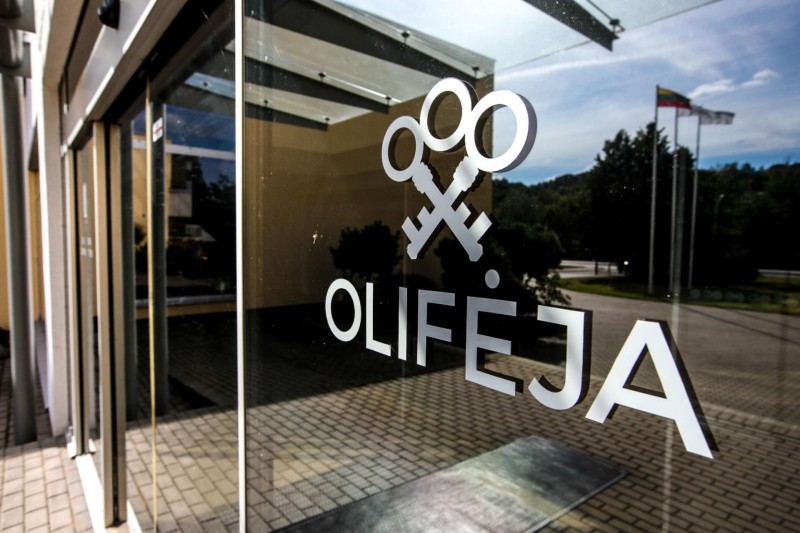Two businessmen have become millionaires through a Lithuanian lottery — without buying a single ticket.
Antanas Muraska and Donatas Kazlauskas, the two directors of the Olifeja lottery, have diverted millions of euros into their own pockets, according to an investigation by OCCRP‘s Lithuanian member center, 15min.lt.
Olifeja was and still is much more than a private venture. It was founded to fund Lithuania’s Olympic athletes. More than two decades after the company’s establishment, it still calls itself an “Olympic lottery,” and is still the principal funding source for the Lithuanian National Olympic Committee.
But the two lottery executives also amassed personal fortunes by evading the company’s obligation to share its profits with the athletes, the investigation found.
Over a 14-year period, Olifeja paid a significant fraction of its income — over $120 million at current exchange rates — to several private companies owned by Muraska and Kazlauskas in exchange for services of dubious value.
The Lithuanian National Olympic Committee originally owned and operated the lottery, which is the Baltic country’s largest, but over the years ceded both control and profits to Muraska and Kazlauskas.
The committee’s former president, Arturas Poviliunas, said he trusted the pair to make decisions, and knew nothing of its operations. Shortly after retiring, Poviliunas became president of one of the committee’s branches that received thousands of dollars from a separate lottery business run by Muraska and Kazlauskas. That one supported Poviliunas’ passion for writing.
Lithuanian legislator Agne Bilotaite, who spent several terms specializing in anti-corruption policies, has described the appropriation of Olifeja’s profits as a “robbery of the sports community.”
On the other hand, the country’s prosecutor’s office has said that it found no evidence of unlawful activity.
Olifeja estimates it donated about $93 million to sports between 2004 and 2018.
Taking a Cut – and Another
Olifeja was established in 1992 with the sole purpose of raising money to fund Lithuanian athletes. It is now the largest lottery operator in the country, currently controlling 79 percent of the market.
The company was the creation of Muraska, then a senior accountant for Lithuania’s Committee of Physical Education and Sports. He approached the National Olympic Committee with the idea of starting a lottery to benefit athletes, and came up with the company‘s name, a mash-up of the Lithuanian words for Olympic and fairy.
After the Olympic committee approved the idea, Muraska became Olifeja’s director, a position he still occupies. He was joined by Kazlauskas, the Olympic committee treasurer. When the first lottery tickets were being printed in Ukraine in the early 1990s, it was Kazlauskas, Olifeja’s deputy director, who drove them to Lithuania in the trunk of his car.
When Olifeja was founded, the Olympic committee was entitled to all of the lottery‘s profits as its sole shareholder. The company distributed the funds to the country’s athletic federations for athlete training and Olympic preparation.
That changed in 2000, when Muraska and Kazlauskas sold themselves a 47 percent stake in the company in return for a $225,000 investment. Nearly half of its profits would now go to them. On its website, the company reported that it needed the capital infusion in the aftermath of the Russian economic crisis of 1998, which created problems across the region.
The Olympic committee approved the sweetheart deal — which was just Muraska and Kazlauskas’ first cut.
Almost three years later, Olifeja began a merger with a subsidiary that operated its lottery terminals and distribution infrastructure. The company said the move was meant to cut costs and optimize operations. According to its own calculations, Olifeja could save more than $2.5 million annually by bringing those services in-house.
But shortly afterward, Muraska and Kazlauskas established a business of their own, a lottery service provider called Lotelita. In April 2004, Olifeja sold its newly acquired terminals to Lotelita for about $700,000. The new company became Olifeja’s official lottery services provider, though Olifeja had just absorbed its subsidiary so it could do that job itself.
As justification for the deal, Muraska has said the terminals were outdated and in need of replacement — just “iron,” as he put it — and that the price his company had paid for them “exceeded their value.”
But almost immediately, the outdated terminals became a big money-maker. Millions began flowing from Olifeja into the new business. In 2004 alone, Olifeja paid Lotelita almost $6 million for use of the approximately 1,100 terminals and other lottery services, more than seven times the cost the company had incurred in buying the terminals.
It didn’t take long before Lotelita began to expand its business further, based largely around those same terminals, which are common sights in Lithuanian convenience stores and gas stations. Lotelita repurposed them to serve mobile operators, collect utility payments, and even issue quick loans — all for a fee that went straight to Lotelita. Meanwhile, Olifeja is still paying for the use of the terminals, which now number over 2,000.
As a result, in 2004, for example, Lotelita‘s net profit was more than $1.2 million, most of which came from its contracts with Olifeja. In the same year, Olifeja’s net profit was under a million dollars. The difference grew even bigger the following year, when Lotelita outmatched Olifeja by a landslide, earning $2 million of net profits versus Olifeja’s $479,000. Unlike Olifeja, Lotelita had no obligation to share its profits with the Olympic committee or its athletes.
From Lotelita‘s establishment in 2003 until 2017, Olifeja paid it more than $120 million for lottery-related services. In Lotelita's early years, Olifeja's money made up to 90 percent of its total income. As Muraska’s and Kazlauskas’ business network grew, its sources of income became more diverse and the Olifeja money grew less significant.
Lottery terminals used to sell Olifeja tickets are a common sight in Lithuanian retail stores and gas stations.
New Winnings
Lotelita also made money in other ways. For example, Olifeja sold its office to Lotelita for about $2.2 million in 2003 and began renting part of the building it had previously owned. Up to the end of 2017, Olifeja has paid more than $2.26 million in rent.
Lotelita has also been contracted by Olifeja to produce a television lottery show, Teleloto, which has an enormous audience in Lithuania. Olifeja also hired Lotelita as its main marketing service provider.
The two Olympic businessmen even used the lottery as a personal bank. Both Muraska and Kazlauskas received interest-free loans from Olifeja. Muraska used his loan of around 360,000 euros to build a luxury house in Lithuania’s capital, Vilnius. Kazlauskas used a 107,000-euro loan to buy a flat in Juodkrante, a small town on the Curonian Spit, a U.N. World Heritage Site and one of Lithuania’s most picturesque places.
Additionally, in 2005, Lotelita gave Muraska another interest-free loan of 1.7 million litas, or about 492,000 euros.
Both businessmen told 15min that making personal loans to employees was once a “common practice” at Olifeja, though it ceased after 2008, when the Lithuanian tax office banned such deals.
The two men didn’t confine themselves to lottery services. In the years after getting their first major contract from Olifeja, Muraska and Kazlauskas set up a business facilitating payday loans, an insurance brokerage, and even another lottery company that competes directly with Olifeja.
In 2008, for reasons that remain unclear, Olifeja used 3 million litas (about $1.2 million) to secure a loan for the duo’s payment processing and lending company, UAB Perlo Paslaugos.
These businesses ended up being more profitable than Olifeja itself, earning Muraska and Kazlauskas $37 million in net profits. The two men also received about $11 million in dividends from Olifeja between 2003 and 2017, according to reporter’s calculations based on the company’s annual reports.
The house Muraska built using his interest-free loan from Olifeja.
Reluctant Millionaires?
Muraska and Kazlauskas have explained their actions by citing restrictive legislation.
A new lottery law that came into force in 2004 made it impossible for Olifeja to service its own lottery terminals or conduct any other form of business, such as marketing, television production, or even owning its own building, they said.
Muraska also has said Lithuanian officials told them that having a service-providing subsidiary for Olifeja was not an option.
“I was told that organizing lotteries is the only thing. And that’s it. You cannot engage in any other activities,” he told 15min in an interview.
However, Arnoldas Dilba, head of the legal affairs at the Department of the Lithuanian Gaming Control Authority, told 15min that the law on lotteries did not contain such restrictions.
Ruta Bilkstyte, a leading Lithuanian tax consultant, said Olifeja’s operations should have been structured to maximize the amount of money donated to Lithuanian athletes.
To achieve this, the companies under Muraska’s and Kazlauskas’ control should have been created as subsidiaries of Olifeja, thereby entitling the Olympic Committee, which owned just over half of the company, to half of the profits, Bilkstyte said. Instead, only Muraska and Kazlauskas profited.
For their part, Muraska and Kazlauskas argue that their separate business ventures helped increase Olifeja’s ticket sales. Since the lottery donates 8 percent of its annual ticket sales to the Olympic Committee, their business helped increase funding, they said.
Playing by the Books
Muraska and Kazlauskas say they always operated with the approval of the Olympic committee. At the time their lottery plan took shape, the committee was headed by Arturas Poviliunas, who had been at its helm for more than two decades.
Now retired, Poviliunas has been spending his free time writing books about the Olympics. All six have been published with money donated by Muraska and Kazlauskas from the proceeds of Euloto, a lottery company they established in 2008.
Under Lithuanian law, companies that run lotteries, including Euloto, must donate 8 percent of their ticket sales revenue to charity. In Euloto’s case, the designated charity is the publishing arm of the Lithuanian Olympic Academy, a branch of the Olympic Committee.
Shortly after retiring from the Olympic committee, Poviliunas became the president of this small organization. He is also the primary author of the books it publishes. Since 2014, Euloto has donated more than $24,000 to the academy’s publishing endeavors. It is not known how much of this was spent on Poviliunas’ literary output. The publishing house that printed the six books claims that he received no royalty payments.
In a telephone interview, Poviliunas confirmed that Muraska and Kazlauskas were funding his post-Olympic Committee writing career, but he noted that he had also contributed money to the endeavor.
Poviliunas also said he was unaware of how much money had been diverted from Olifeja to Muraska’s and Kazlauskas’ business interests. He said he had fully trusted the two men.
Povilunas’s successor, Olympic athlete Daina Gudzineviciute, said she was aware of Olifeja’s relationship with the companies Muraska and Kazlauskas owned. She said the deals were being audited and, so far, no suspicious activities had been found.
“Apart from companies controlled by Muraska and Kazlauskas, there are no other suppliers capable of providing these services,” she said in a written response. “I know this situation might cause some doubts. That’s why all of these deals were evaluated by external experts.”
Gudzineviciute, who won the gold medal in trap shooting at the 2000 Olympics in Sydney, beat another Olympic champion, discus thrower Virgilijus Alekna, in a close race for Poviliunas’ seat at the Olympic Committee.
Since she took up the position, Olifeja has paid Muraska’s and Kazlauskas’ businesses another $60 million for lottery services, rent, marketing, and TV production.
A Belated Spotlight
On Dec. 12, 2018, after 15min published a version of this story in Lithuania, the Anti-Corruption Commission of the Lithuanian parliament held a hearing on the case.
In her testimony, Gudzineviciute sided with Olifeja’s bosses. Asked if she could tolerate Muraska’s “perpetual conflict of interest” in managing Olifeja and owning companies that benefit from the lottery, she replied: “The law allows having shares in various companies.”
In her testimony, Gudzineviciute also mentioned that the Lithuanian Prosecutor’s Office had asked for some Olifeja-related documents. The request had followed a request by Agne Bilotaite, a member of Parliament and its Anti-Corruption Commission, for an investigation after 15min published its report.
“I assure you, we will hand over all the documents we have,” Gudzineviciute said.
In a written comment, the prosecutor’s office confirmed that the division in charge of defending the public interest had looked into the lottery, but after examining the documents provided by the Olympic committee, decided there was no evidence of unlawful activity.
Lithuanian athletes have had mixed reactions. A few athletic federations, which had already been in conflict with the Olympic committee over money and a lack of transparency, used a joint statement in December 2018 to accuse it of “fooling” the country’s athletes.
“It is hard to understand how the current leadership of the Olympic Committee and its president failed to see or didn’t want to see what was happening in the company controlled by the Committee,” says the statement from the federations that represented athletes participating in the biathlon, karate, and rowing.
“We consider the actions by the Olympic Committee to be acts of negligence, incompetence, or some kind of unwritten and maybe even criminal deal,” the statement says.
However, some of the country’s greatest Olympians refrained from any harsh criticism.
“We’ve had a long discussion about it, and we finally decided to withhold from crying and shouting,” said Marius Paskevicius, a top judo wrestler.
But he added, “Of course, we’re glad all of this has become public.”
‘We Could Be Billionaires’
Speaking to 15min.lt in November, Muraska clearly was not worried about the future of his Olympic business empire.
He took full credit for Olifeja’s creation and the benefits it had brought to Lithuanian athletes, even while admitting he built his fortune with resources and cash that came directly from Olifeja. If given another chance, however, he said he would do things differently.
“If we could go 20 years back in time, we would have probably made a lot of decisions in a different manner. A lot of decisions,” Muraska said. “And we could be billionaires, not millionaires.”
In early 2018, Sarunas Cerniauskas, one of the authors of this story, performed due diligence research services for a private client. The work was connected to the Lithuanian gambling industry, but was not related to Olifeja or to the lottery sector.








